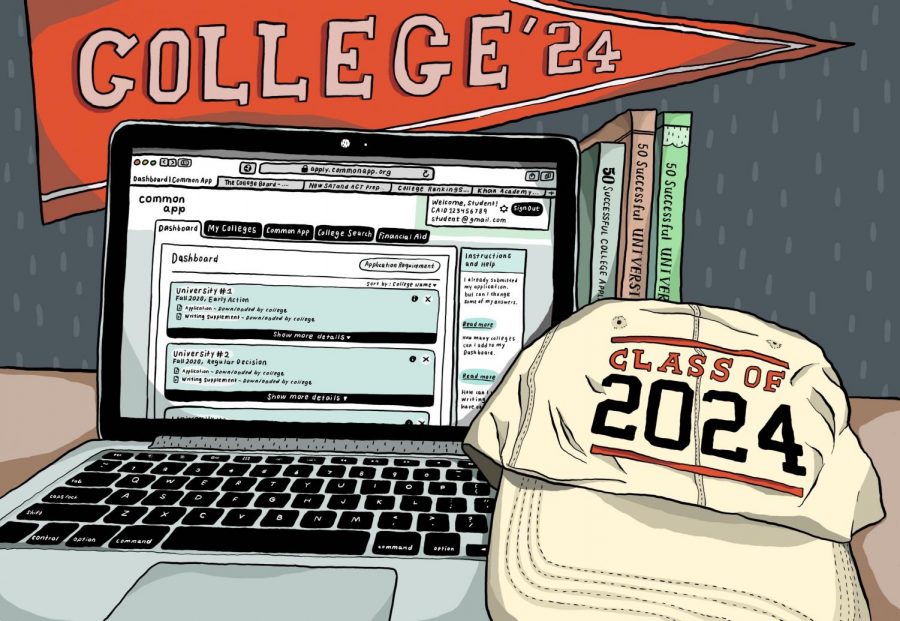Tribune seniors answer 12 college application questions
Whatever you’re feeling in anticipation of college applications — anxiety, excitement, stress — just know that the whole world cheering you on. Kill it, Wildcats.
May 28, 2020
As seniors graduating from the Tribune and high school, we wanted to answer some of your most frequently asked questions about the college application process. We hope that our responses, which call upon our own experiences, contribute to a healthy and more open dialogue about the often-stigmatized stress surrounding college applications. In the end, we wish all of you only the best in your academic pursuits as you continue to learn new things, encounter new experiences and grow as students and people. Go Wildcats, forever!
Now, onto the questions …
How important are awards/competitions for your extracurriculars? (Sophomore)
- They are definitely beneficial for your application but not a necessity. I’d prioritize participating in extracurriculars that you actually enjoy, as you don’t want to spend your high school years being someone other than yourself. When you describe your extracurricular experiences in your essays, college admission officers can tell from your writing style whether you are actually passionate or just did them for a resume. -Ronit
- It’s undeniable that awards boost your application, but it’s always most important that you enjoyed putting in the work to receive them. It’s definitely not true that you must have an award to be admitted to your target or reach schools — if anything, some of my most memorable peers and mentors were accepted into their reach schools without any awards at all. (One of my friends is rumored to only have put two activities on his/her Common App activities list, but was nevertheless admitted to an extremely selective school.) Think of awards as a natural part of many of our academic careers; they highlight excellence and dedication. But don’t partake in something just for the award — and even if you do, at least try to enjoy the process of doing it! -Daniel
- What Daniel said a hundred times over! Awards can highlight your strengths and reflect passion, but receiving awards is not by any means the only way to do so. Having said that, I suggest striving to tackle competitions, big and small, relevant to your extracurricular passions, if it does not present an excessive burden in addition to your typical workload. It can be a good way to challenge yourself in activities you like to do and bolster your application. What colleges are looking for is commitment. Think of how you can show that. -Sarah
How important is it that you focus on your career path/major during high school? (Sophomore)
- Unless you already know what you want to do when you grow up, I don’t think it’s that important. I didn’t know what I wanted to major in until senior year, when I was forced to choose for college apps. Even now I still don’t have a super clear idea. It’s more important to spend time exploring your interests and trying out different things, so you find what you’re passionate about. -Steven
- High school is a time when your mind changes often. I didn’t even know what I wanted to study until senior year and I still feel it could still change in college. I’d recommend exploring a variety of activities in high school, through which you will eventually find your passion. -Ronit
- It’s not important at all. I didn’t know what I wanted to do until my first semester of senior year. I feel like we’re all expected to know our futures at such a young age. I mean, we aren’t even allowed to vote yet, what makes people think we know what we want to do with the rest of our lives? If you do know what you want to do, good! Take some courses, make sure you truly understand what you are going to pursue. If you don’t know what you want to do, explore! Take classes you find interesting. I didn’t know I wanted to pursue teaching until I took Academic Leadership. It’s really up to you and what you want to do. -Harshita
- First of all, if you’re set on a career path and major already, then huge kudos to you. If you’re not set yet — like me, as well as many of my senior peers, even now — don’t worry at all! From what I’ve heard, half of the freshmen at the college I’m attending change major preferences during their first year, simply because you’re exposed to so much more in college than in high school. My advice is to do what you enjoy, whether or not it is directly relevant to your career path/major. I personally have never wavered from my childhood love for math and am certain that I’ll pursue a major founded upon quantitative thinking, but many of my extracurriculars are not really quantitatively “focused” at all — for example, journalism, which was easily my biggest time commitment over the past two years. Even though it’s highly unlikely I’ll major in humanities or social sciences, journalism shaped me as much as math has; it’s really changed me as a person and allowed me to think multidimensionally. You’d be surprised by how much you learn from activities that may not seem relevant to your major, so I’d encourage you to keep exploring, even if you feel set on a career path or major already! -Daniel
- Like everyone has said before me, it’s not much of a big deal. Career paths and majors very often change for college undergraduates and are naturally prone to be much more volatile for high school students. Simply pursue what passions or interests (synonymous to hobbies, even if that word may seem underwhelming at times) you currently have and attempt to develop new ones. What colleges are really paying attention to is your commitment, how likely you are to apply yourself on their campus with genuine, sustainable zeal. -Sarah
What do you wish you could have done in your freshman/sophomore/junior year to put on your college application that you didn’t do? (Sophomore)
- Once I started my college apps, I definitely wished I did more extracurriculars related to my major, including an internship. However, this would have been hard anyway, since I didn’t know what I wanted to study until senior year. -Ronit
- When I filled out college apps, I was really kicking myself for not joining the big clubs. I didn’t really do the whole CSF and NHS thing (which seems to be a big thing at DV, apparently). But then I realized it would’ve looked out of place on my application, because a lot of my applications were focused on how I spent my high school career doing what I wanted to do. My point is that there are always application fluffers (things you add to the apps to make it fuller) but they’re not the only important things. Yes, I did wish I was involved in clubs to make my application look more “scholarly,” but I realized that they stripped away from my experiences in high school. I didn’t really like the clubs on campus that much, so I started my own with my friends. I took French (and then stopped because French is hard and I didn’t have time for passé composé). I think my application showed that I did whatever I liked to do, and that’s what matters the most. -Harshita
- I’m really happy with the experiences I’ve been blessed with during high school and wouldn’t really trade them for anything else to put on my college apps. I always have things I look back upon and wish I spent more time on, such as learning Chinese, picking up the guitar, playing more piano, reading more books, spending more time with friends … the list goes on. But I’m content with my growth over the past four years, and I’m happy with how my applications reflected that. -Daniel
- When I was writing out my application, I briefly regretted not forcing myself to participate in more clubs, especially since there were a few that I dropped after freshman year. So, I would recommend that if you have an activity you’ve dropped or are close to dropping because you feel lethargic or apathetic, reflect on why you feel that way and ask yourself if you actually have a good reason to drop it. Burnout or overwork is a valid reason, so please keep that in mind, my poor DVHS underclassman. Ultimately, I look back on my high school experience with satisfaction and pride. I did what I wanted, did it with passion, and it was enough. Be reflective, have integrity, and stay true to yourself. Regrets may be inevitable in the long run, but you have the power to refuse to dwell on them and move on, assured in the knowledge that you did what was right for you. -Sarah
How did you all choose which colleges to apply to and which to apply early? (Junior)
- I chose my college list based on my two criteria: a good program for my major and a good sports environment (I can’t live without sports!). I’d recommend keeping this list down to 15 schools or less, as most applications will have bulky essays that will take time. I actually applied early action for every school that has an option, but no early decision as I didn’t have a clear No. 1 preference. -Ronit
- If you know you want to attend a certain school and you can see yourself on that campus, I would suggest considering Restrictive Early Action or Early Decision. In the case that the school(s) you are considering offers the option of applying non-restrictive Early Action, then as long as you think you can produce a good essay/application by that early date, I’d regard it just as I would the Regular Decision deadline and go ahead. It’s always nice to know your results early. Don’t overthink it. If you’ve done your research and you feel very strongly that you belong at a particular school, shoot your shot. -Sarah
- I mainly chose to apply to colleges based on their selectivity and strength for my major interests (which are generally math, physics and biology). I chose my Early Action school mainly because my role model is a current student there, and I’ve heard many amazing things about the school from her. -Daniel
When is an appropriate time to start brainstorming and writing? (Junior)
- You can start brainstorming in August itself, when most of the essay prompts are released. However, I’d actually recommend waiting until at least September to start writing, as your senior English classes will help your narrative writing improve. -Ronit
- I started brainstorming the summer before senior year and started writing out drafts for some of my essays during this time too. It felt nice to have a bit of a head start heading into the school year, and it helped me to manage my time better as I adjusted to balancing a greater workload. I also enjoyed, and really needed, the extra time to revise my essays. -Steven
- I started reading successful past essays and getting myself in the college application mindset in early July, and a couple weeks afterward I started brainstorming and writing my Common App. -Daniel
How do you know what to write about in your application? (Junior)
- First, you want to make sure that you are answering the prompt that the essay asks for. Also, college essay advisors release essay guides each year that give advice on how to strategize your essays. Reading those guides really helped me pick experiences in my life to describe in my essays. -Ronit
- You don’t! Ahhh! Until you do. Aha! … Sorry. In all seriousness, though, ideas really do come and go as they wish, so allow as much room as you can for inspiration to naturally take root. Engage in conversations with your friends and family about your essay ideas, partake in a new (or familiar) activity, go through your photo albums, or make a list of everything that matters to you. Trying to forcefully squeeze out your brains onto a blank Google Document holed up in your room will only be counterproductive, especially at the beginning of the writing process. -Sarah
- This is probably one of the toughest parts of the entire college application process. Especially at the beginning, it’s extremely difficult to figure out what you want to write about, and then how you want to write it. You can first try sitting by yourself and staring at a blank screen, which surprisingly worked for me relatively well compared to many of my peers, but I think the best initial ideas come from talking to people you’ve shared meaningful academic (or not!) memories with, and recalling through those some moments or experiences that have really shaped you into who you are today. Additionally, speaking with people who have gone through the college application process or reading successful past essays can help you understand how to retell your story in a way that fits the college application format. Another very powerful idea is to write a letter to somebody very close to you about some experience or activity that matters to you; one of my close friends got her Common App by writing a letter to a very close mentor of hers, then rewording the letter to become an essay. Ultimately, remember that you’re not alone and that so many people have gone, are going and will go through this process, so just reach out and talk! -Daniel
- Write what feels like you. When all is said and done and you reread your essay for the final time, it should be yours. Ideally, no one else should be able to write what you wrote because it’s based on your own experiences and how it affected YOU. I spent a lot of time brainstorming and reflecting about what to write and about potential topics; I started many drafts, just writing what came to my head, and ultimately didn’t end up using most of them. Feel free to experiment — you’ll know eventually. –Steven
Some college essays have similar prompts; how can you organize your writing process in a way that helps avoid answering similar prompts in different ways and makes writing a unified response easier? (Junior)
- For prompts that are very similar, I just copy pasted the entire essay and changed areas of the essay that contained information specific for a certain college. If a similar prompt has different word counts, I would just use the essay with the lower word limit for both as long as it meets the minimum word requirement for both. As long as the essay answers the prompt, it’s not necessary to write more. Word limits are simply a max limit, so I wouldn’t feel compelled to reach as close as possible to them. -Ronit
- What Ronit says upstairs. Keep in mind, though, that even if the prompts seem similar they can be very different depending on the way the question was worded. Make sure you are actually answering the prompt and also to answer it in a way that doesn’t seem manufactured. Embed unique facts or details that personalize your essay. -Sarah
- I actually planned this out carefully before I began writing because I wanted to highlight more parts of my life and academic career to give college admissions officers as well-rounded a view of me as possible. This also helped me refine what messages each of my essays aimed to convey. I prioritized certain activities that were more important to me for longer essays, such as the Common App, and other activities for supplemental essays, in different orders. All in all, I do encourage you to plan this out before you begin writing! -Daniel
How do you keep organized and stay on top of deadlines during the application process? (Junior) / What motivates you to complete all your work and assignments on time? (Junior)
- I made a list of all colleges and deadlines on a Google spreadsheet and also my bedroom wall. I also made a separate Gmail account for college apps as it really helped to separate college emails and essay docs from everything else. -Ronit
- Spreadsheets! Use a spreadsheet or planner to keep track of important details, dates and deadlines! Things can get very overwhelming when you have to keep track of the materials required by each school you wish to apply to. There are free templates online. As for motivation, I can’t help you there. I am a procrastinator to my bones; in fact, I am currently typing this out two days after this article was due (whoops). I recommend doing everything you can to keep yourself accountable, such as dragging your friends out to a cafe or local library and working on your apps in their company. Or set yourself a faux deadline at least a week before the real deadline. Hypnotize yourself. Whatever works. Do it. -Sarah
- This one is for my procrastinators. I don’t think you understand when I say I literally waited until the last minute. I’m talking about almost forgetting to submit your application until the day it’s due. Something about working dangerously under pressure seems to work for me and that may be the case for you too. But don’t push it too hard like I did. You need to be able to gauge how fast you work and the quality of the work you put out when you are working so close to a deadline that is important. I think the only thing that motivated me was the fact that the deadline was in a couple of hours and if I didn’t submit the application, my parents would not be too happy. Also make lists. -Harshita
- Like Sarah, I used a spreadsheet to keep track of my colleges, but it definitely wasn’t as comprehensive as some of the ones I’ve seen among my classmates. Anyway, I think you’d be surprised by the number of your classmates that end up procrastinating. Don’t worry if it seems like everyone else is ahead of you, because they’re really not (and even if they are, who cares? I was the slowest of nearly all of my friends, but I’m happy where I am). In my experience, I’ve always been an extremely slow writer — even when it comes to journalism — and I wrote very few essays compared to my classmates. Additionally, I was supposed to have completed essays for 10 of my 15 schools before winter break, but I’d only finished three or four by then. Given that I am happy with my acceptances, though, keep in mind that things always work out, and just don’t worry too much if you are behind on your deadlines. -Daniel
- Like everyone else said, make a spreadsheet with all the information you need, such as deadlines and specific requirements for all the colleges you’re applying to. It made it a lot more organized and manageable for me. I also made a Google Doc with links to all my portals so it was more convenient. I’d also recommend setting reminders on your phone for important dates and small tasks. As for motivation, it helped to make a to-do list; physically writing down and giving yourself a deadline made it much more real for me and forced me to work on it. It was also satisfying to cross it off once I had. –Steven
On average, how much time did it take to complete the essays for an application, and how varied were the prompts? (Sophomore)
- This could really vary from an hour to a couple days, as not all colleges have supplemental essays, while others have bulky ones. There was a good variety of prompts, but many similar prompts asked questions like: Why do you want to attend (specific college)? Why do you want to study your specific major? -Ronit
- That is totally up to you! Just like a painting, college essays are only finished when you decide to put the brush down for the last time. It also depends on when you pick up the brush, for that matter. If you start it the night it’s due, well … you better finish that baby in a few hours. The prompts can be quite varied depending on the college, but you can count on most colleges requiring at least one smaller essay on why you think that college is the right fit for you. Such essays usually took me less time than the more creative ones that asked for me to express my identity in one shape or another. The wackiest prompt I had to answer was, literally: “Where’s Waldo?” -Sarah
- It took me a crazy four months total to write and keep revising my Common App, and it took me a couple weeks to a month for most of my supplements. However, I finished my supplements for one college in only two days, and I have many friends who took about one day for each set of essays from a school. Overall, it varies a lot from person to person. In regard to prompts, I wrote very few essays compared to many of my classmates (only the UC’s, the Common App, three sets of supplements and the MIT essays), so I’m probably not the best person to ask about prompt variety, but there were definitely at least three or four essays that I was able to reuse. -Daniel
- I spent so much time brainstorming and outlining that my first drafts took probably around an hour or so. Obviously I had teachers and friends look over it, which took a couple of days. So I’d say the overall process took a couple of weeks (including the outlining). Brainstorming and outlining helped a lot in terms of speed, because I knew how I wanted the basic ideas and structures to look like. -Harshita
How do you deal with rejection from colleges? What do you tell yourself? (Junior)
- I was fortunate to have all my acceptances in the early action pool and all my rejections in the regular pool. Rejections are part of the process and everyone gets them. At the end of the day, you will only be attending one college so I wouldn’t focus too much on rejections. -Ronit
- I … guess I didn’t, really. It happened, and I went, “Oh well,” and proceeded to delete that memory from my very existence. Ronit’s response to this question hit home for me though. For me, it helped to know that I applied only to schools I would be delighted to attend, whether they were safety, target or reach schools. It made it easier to stomach the rejections because that way, even if I only got accepted into one, I would be perfectly content with that outcome. -Sarah
- I just had to remind myself that the rejections don’t determine my self-worth. The colleges don’t know that I am the coolest kid on the block or the funniest person on planet Earth because of just how narrow the application process is. It doesn’t encompass everything about you so the rejections aren’t exactly a jab at your ability as a student. And as for dream schools, you have to realize that maybe it wasn’t meant to work out the way you wanted it to. I know that sounds like some cosmic “leave it to fate” kind of thing, but in reality you will go to the college that is the best fit for you as a person. Also remember you can always transfer into the college you got rejected from. -Harshita
- I’m not really sure. Know that it’s okay to be sad; know that other people are most definitely feeling the same things that you are so you aren’t alone; also know that the feeling does pass. If a college rejects you, it’s really their loss and is absolutely not a reflection of who you are as a person. At the end of the day, it’ll all turn out okay. –Steven
How do you know that you have found the right college for you? (Junior) / How did you choose the school you committed to? (N/A)
- First, you should visit colleges in-person (if possible) or at least virtually to get a glimpse of the lifestyle and see if you like it. For me, I had two main criteria for my college fit: a good program for my major and a good sports environment (I can’t live without sports!). Basically, a college should foster not only your area of study but also your hobbies/interests. Once decisions came out, I did extensive research on all the programs I got into. Based on my research, I chose the school that has arguably the best job recruitment and research program for my field out of the schools on my list. -Ronit
- Everything Ronit said. Visiting often helps to shape a solid idea of what kind of college experience you will be experiencing on campus, so I definitely recommend doing that if you can! I also spent lots of time on college websites and Youtube/forums to get a feel for the school culture straight from the mouths of current students. If there are certain opportunities, events, or activities you know you wish to delve into as an undergraduate, make sure to research what your prospective schools have to offer in that direction. -Sarah
- Like Ronit said, visit your campus if you have the chance. If you can’t, watch videos and read about it as much as you can. Before committing, try finding alumni and people who attend the college and try to get as much intel as you can. If you are too scared to do that, type your question into Google and chances are, someone on Reddit probably had the same question. Make sure you figure out the social life on campus and see if it fits your needs. Scout good restaurants nearby. I almost picked a college where there wasn’t a good coffee place on campus and I don’t know how I would’ve dealt with that. For me, committing to the college I did felt right. I knew it was the campus I wanted to be on and it had the right department and the right food. You just have to gauge whether the campus passed the vibe check or not. -Harshita
- I dedicated my spring break toward making this decision, and it was really tough, as I knew I’d be so happy attending either of the schools I was admitted to. Being the objective, meticulous and thorough person that I am, I created this whole 10-page document with a table of current students that I wanted to talk to and wrote up “interview” questions (journalism, wink wink) for six main factors that mattered to me: STEM academics and research, clubs, leadership and networking, pre-med opportunities, time management and general atmosphere. Aside from some more specific academic points, I felt comfortable choosing my college because it felt more like home to me, based on the feeling that I got from talking to current students there. Ultimately, when the time comes, just really dedicate time and effort to making that important decision. If you do, then I believe you will feel confident in your choice. -Daniel
What’s the best piece of advice you received that you want to pass on? (N/A)
- When I talked with a current college student, he advised me to not spend too many words emphasizing your achievements/resume in your essays. You already have a separate activities section in the Common App profile to describe those. Instead, use your essays more to describe your experiences and interest with activities/hobbies. This is something new I learned during the process. -Ronit
- Take a couple days of break in between edits of your essays. It helps you look at things with such a fresh point of view (and bonus points because you catch a lot of grammatical errors). -Harshita
- Don’t procrastinate. That little piece of advice didn’t do anything for me in the long run, but it was a very, very good piece of advice in hindsight. -Sarah
- Spend a lot of time on your essays. They’re a pretty important part of your application and helped me learn a lot about myself; brainstorming what to write, how to write it, and editing it can take a long time. Also, if possible, I’d recommend applying Early Action to as many schools as you can, especially safety schools, or just submitting your application early to schools with rolling admissions (I didn’t ED or REA anywhere). It’s nice to get a decision earlier, and knowing that I had a place to go to for sure was consoling heading into March. –Steven







